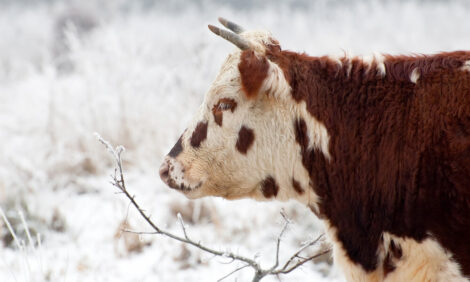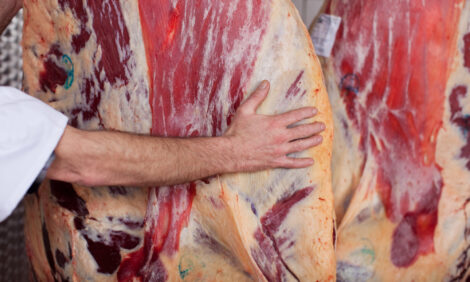



Korean cattle farmers worried over imports of U.S. bone-in beef
SEOUL - Allowing imports of U.S. bone-in beef could seriously undermine the profits of South Korean cattle farmers by driving down cattle prices here, a state think tank warned Thursday.Beef imports could surge 70 percent this year from last year's 179,000 tons if the import of American bone-in beef, including ribs and loin meat, is allowed from the middle of the year, the Korea Rural Economic Institute (KREI) said.
In that case, prices for domestically raised cattle are projected to fall 5.1 percent by the end of the year, eroding domestic cattle growers' earnings, it said.
A fully-grown "Hanwoo" cow or steer weighing 600 kilograms can cost up to 5 million won (US$5,340) on the market, depending on its gender. The price of a comparably-sized animal raised in the United States is far cheaper.
Before Korea imposed its ban on American beef in late 2003 because of a mad cow case in the United States, the country imported an average of 5,670 tons of American beef per month. Added to the amount Australian beef imported last year, that translates into roughly 300,000 tons of beef that could be imported into Korea annually if all restrictions are lifted in the coming months, the institute said.
The World Organization for Animal Health is expected to review beef safety standards in the United States within the next few months. It will send recommendations about the safety of U.S. beef for consumption to its member states after May.
At present, South Korea and the United States have yet to agree on how to deal with bone fragments. Per its interpretation of a bilateral agreement signed in January of last year, Seoul has rejected three U.S. shipments of beef totaling 22.3 tons after small bone fragments were discovered during safety inspections.
In addition to the possibility of a sharp rise in beef imports, the think tank and the Ministry of Agriculture and Forestry said calf prices must be monitored carefully.
"Prices of calves have been high due to good prices for Hanwoo cattle on the market, but if the latter were to fall suddenly, farmers could be hurt," said Lee Chang-buhm, the agriculture ministry's spokesman. Lee pointed out that farmers could be most hurt if they buy calves at premium prices and then have to sell them as fully-grown cattle when market prices are weak.
The research institute, meanwhile, forecast that measures by Seoul to push for the signing of free trade agreements with other countries and possible advances in the Doha Development Agenda talks could cause Hanwoo cattle prices to fall until 2009. However, it said that if farmers continue to improve quality to meet consumer demands, prices could rebound after 2010.
TheCattleSite News Desk


